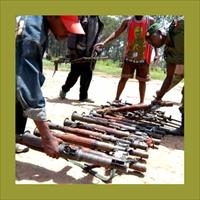Irresponsible arms transfers wrecking attempts to reduce poverty

Global commitments to reduce poverty and improve lives cannot be reached unless the international community makes urgent progress towards controlling the arms trade, according to a new Oxfam report released today.
The report “Shooting Down the MDGs”, says many countries will not reach their Millennium Development Goals because of irresponsible arms sales. It shows these cause damage far beyond the immediate effects of stoking conflict and armed violence.
Many countries allow weapons sales without considering the potential impact on poverty. Some governments also buy arms at a high cost, putting them into debt and squeezing the amounts of money left to fight poverty. The lack of transparency and accountability in the arms trade means it is easily open to corruption and waste, again draining countries of money that could be used to improve ordinary peoples’ lives.
An international Arms Trade Treaty, which is at a crucial stage in the United Nations, should include powers to stop an arms transfer which would put development at risk.
Jeremy Hobbs, head of Oxfam International, said:
“The Millennium Development Goals are the basic targets for ensuring our fellow human beings can live decently. Many countries are failing to meet those goals, and the uncontrolled arms trade is one of the reasons why.
“As well as prolonging and intensifying conflicts, the poorly regulated arms trade causes huge levels of waste, corruption and debt. This is money that is unlikely to be providing security and could be used instead for hospitals, schools and infrastructure.
“Oxfam is not against responsible arms sales for legitimate defence or policing needs. But at the moment the regulations on the arms trade are piecemeal and chaotic. This unregulated business is destroying the hopes of millions of people for a better life for them and their children.
“A global problem needs a global solution. The arms trade is out of control, and in urgent need of regulation. An Arms Trade Treaty is necessary and entirely possible. All that is needed is political will. All governments must agree to move to negotiations on the Treaty as quickly as possible.”
Oxfam’s new report shows the link between armed conflict, irresponsible weapons sales and development failures.
Two thirds of the countries most likely to miss the Millennium Development Goals are in conflict or emerging from conflict. Countries such as Burundi, which do not produce arms, are significantly affected by arms transferred or smuggled in from abroad. These have continued to flow even as civil wars have killed people and destroyed basic infrastructure. As a result, Burundi is not on track to meet any of the Millennium Development Goals.
Liberia has also suffered from civil war fought with imported weapons. But following a ceasefire and election there has been a well-monitored arms embargo and other steps to reduce the number of firearms in circulation. The situation seems to be improving and the reduction in armed violence has coincided with some improvements in meeting the Millennium Development Goals.
Other countries have increased their national debt by making excessive arms purchases, or wasted money in the corruption which can easily surround arms deals. Often military spending is hidden from public or even civilian government scrutiny, leading to inefficiency and reducing the funds available for development.
Turkey continues to increase its national debt by buying arms – possibly as high as $15.8bn since 2000 when the Millennium Development Goals were first agreed. As a result its national budget is very tight and work to improve social welfare and reduce poverty has been hit.
The Arms Trade Treaty is currently under discussion at the United Nations. During October, states will be debating the next stage of the process. Oxfam urges all governments to move to negotiations as soon as possible.
Oxfam is calling for the treaty to include clear criteria on arms transfers which include the effects on sustainable development and the Millennium Development Goals. Governments should examine the risk that the arms transfers will lead to violence that prevents development, or will involve corrupt practices.
Additional Information
1. Delegates will be discussing the next steps for the ATT at the United Nations First Committee (which looks at arms issues) in Oct 2008.
2. In 2006, 153 states voted in favour of the Arms Trade Treaty at the UN General Assembly, 24 states abstained and only the US voted against.
3. A UN Group of Governmental Experts (GGE), was mandated to examine the “feasibility, scope and parameters” of an ATT. It finished its work in New York in August 2008, after having met three times throughout the year. The group, chaired by an expert from Argentina, was composed of experts from a range of countries including Brazil, China, Egypt, France, Indonesia, Mexico, Russia, South Africa, and the UK.
4. The GGE's report will be presented to the United Nations General Assembly in October.
 Back and Next - Back and Next
Back and Next - Back and Next See Also - See Also
See Also - See Also